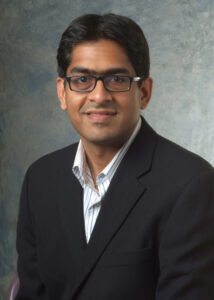Three distinguished members of the Case Western Reserve University faculty—Susann Brady-Kalnay, Paul Tesar and Satish Viswanath—have been elected among 83 “of the world’s best emerging academic inventors” to the National Academy of Inventors (NAI) 2022 class of Senior Members.
Senior members are elected for their “success in patents, licensing and commercialization” and for producing “technologies that have brought, or aspire to bring, real impact on the welfare of society,” according to the NAI.
The 2022 senior members, who hail from 41 research universities, are named inventors on nearly 1,110 issued United States patents. The new senior members will be inducted at NAI’s annual meeting June 14 in Phoenix.
“I’m excited that these individuals’ respective nominations were reviewed, selected and supported by our peer group of existing CWRU NAI members,” said Joe Jankowski, Case Western Reserve’s chief innovation officer. “The new members now join them, not only as inductees, but as an active voice and valued support for all campus faculty and student innovators.”
The NAI is a member organization of U.S. and international universities and governmental and nonprofit research institutes, with more than 4,000 individual inventor members and Fellows from more than 250 institutions worldwide.
“Today, these Senior Members, on their path of prolific discovery, join the NAI innovation community,” NAI President Paul Sanberg said in a release. “With the NAI Senior Member award distinction, we recognize and honor these innovators who are rising stars in their fields.”
Susann Brady-Kalnay

Brady-Kalnay, Distinguished Faculty Researcher in the Department of Molecular Biology and Microbiology at the School of Medicine, discovered the biomarker and developed imaging agents that tag tumor cells to guide surgeons to a more precise and complete surgical removal of tumors.
Specific tumor detection is critical in cancer imaging to avoid unnecessary biopsies, allow treatment at earlier stages of the disease and evaluate therapeutic efficacy. She is the founder of NeoIndicate, a company developing advanced tools for improved tumor detection, imaging and treatment.
“Amazingly,” Jankowski said, “this imaging technology is just one of the six major disciplines or themes of work represented in her patent portfolio.”
Brady-Kalnay is recognized for cross-disciplinary collaboration with engineers, physicists, radiologists and surgeons to advance patient-focused research ideas, and as an advisor and mentor for high school students, undergraduates, medical students, PhD students, postdoctoral fellows and junior faculty.
Paul Tesar

Tesar, the Dr. Donald and Ruth Weber Goodman Professor of Innovative Therapeutics in the department of Genetics and Genome Sciences at the School of Medicine, has pioneered new regenerative approaches to treat nervous system disorders, including multiple sclerosis, neuromyelitis optica, pediatric leukodystrophies, cerebral palsy and brain cancer.
He is co-founder of Convelo Therapeutics Inc., a company now partnered with Genentech Inc. developing medicines to unlock the regenerative capacity of the central nervous system, such as therapies for patients suffering from multiple sclerosis and other neurological disorders.
Among many other accolades, Tesar has received the International Society for Stem Cell Research Outstanding Young Investigator Award, the New York Stem Foundation–Robertson Stem Cell Prize, the National Institutes of Health Landis Award for Outstanding Mentorship and the Diekhoff Award for Graduate Student Mentoring.
Satish Viswanath

Viswanath is an assistant professor in the Department of Biomedical Engineering at the School of Medicine and Case School of Engineering. His multi-disciplinary research focuses on new computational imaging and artificial intelligence techniques to predict responses to therapy for cancer and other conditions.
He has broken new ground in precision medicine, helping to identify which patients should receive which type of intervention while ensuring maximum benefit—especially gastrointestinal disorders, such as colorectal cancers and digestive diseases.
Viswanath has received many awards for research, including the Congressionally Directed Medical Research Program (CDMRP) Early Career Award, the CDMRP Idea Award, as well as a number of technical awards. Among other honors, he was named one of Crain’s Cleveland Business “40 under 40” bright young leaders in 2020.
This article was originally published Feb. 11, 2022.

